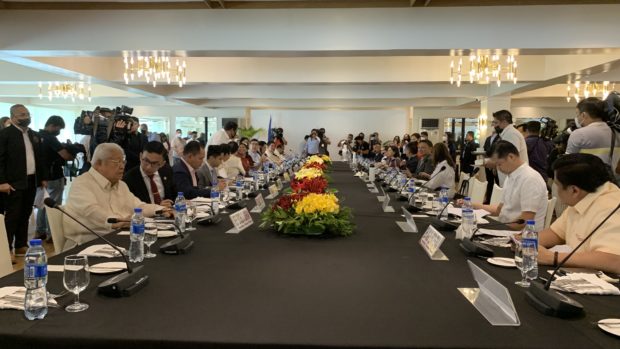
Lawmakers from both the Senate and the House assemble at the Manila Golf and Country Club on Friday to convene the Bicameral Conference Committee that would tackle the proposed 2023 national budget. The committee is tasked to consolidate the House and Senate’s own versions, amid possible differences in adjustments and realignments. (Photo by Gabriel P. Lalu/ INQUIRER.net)
MANILA, Philippines — The Bicameral Conference Committee tasked to reconcile the differences between the House of Representatives and the Senate’s versions of the proposed 2023 national officially convened on Friday.
During the hearing at the Manila Golf and Country Club in Makati City, representatives from the House of Representatives and the Senate tackled conflicting provisions between the two General Appropriations Bill (GAB) for 2023.
The Senate approved the P5.268 trillion proposed national budget last Wednesday, while the House approved it last September 28.
The House leadership ensured that the proposed budget would be approved before Congress goes into a session break, to ensure that the Senate would have a copy of the GAB.
Under the current setup, the Senate can only start deliberating the budget once the House approves the GAB on the third reading.
In his opening statement, House committee on appropriations chair and Ako Bicol party-list Rep. Elizaldy Co assured the public that the GAB “is consistent with the action plan of the this administration” – one that is geared at recovering from the COVID-19 pandemic.
“The General Appropriations Bill is consistent with the action plan of this Administration in addressing the rising inflation driven by internal and external factors, socioeconomic scarring, and low income. We are still on the path of recovery from the lingering effect of the COVID-19 pandemic,” Co said.
“Admittedly, this pandemic transformed each of us in the way we think and create solutions to existing economic problems. The policy choices that we will make in this budget will determine the success of our effort to transition from the impact of this pandemic,” he added.
Co’s counterpart in the Senate, finance committee chair Sonny Angara also assured that while the Senate made amendments to the GAB, they tried to keep the essence of the National Expenditures Program submitted by the Executive branch.
“I know that the current administration worked over time to place there the important programs, especially the ones the President promised during the campaign like the increased funding for agriculture, the continuation of the Ayuda do it in a more targeted form, Your Honors,” the senator said in his opening speech.
“So, kami naman po sa Senado, hindi naman po namin inamenda yan. (So we in the Senate, we did not amend the entire thing.) We made our amendments but I think we kept the essence and we stuck to the principles setforth in the medium term fiscal framework which you also passed in the House,” Angara added.
Co, on the other hand, said he hopes any differences in the two chambers’ versions would be threshed out.
“My fervent hope is that in the coming days, we arrive at a common and collective decision to reconcile our differences and harmonize them with the programs of the present Administration and balance them with the needs of our constituents.”
The bicameral conference committee for the first budget of President Ferdinand Marcos Jr.’s administration comes earlier than past editions. According to Angara, who was also chair of the Senate finance committee during the 18th Congress, the formation of the bicam for the 2023 national budget is one of the earliest in recent memory.
For the then-proposed 2022 national budget, the bicameral conference started on December 6, while both houses ratified the report on December 15 — giving former president Rodrigo Duterte just 15 days to study the budget before the previous year ended.
Under the rules, failure to enact a proposed budget before the current fiscal year ends would force the government to operate on a reenacted budget.
While no list of conflicting provisions has been provided, among the possible issues that would be tackled by the bicameral conference panel is the confidential and intelligence fund (CIF) allocated to the Office of Vice President (OVP) and Department of Education (DepEd) – which are being headed by Vice President Sara Duterte.
Under the House version, CIFs allocated to the OVP and DepEd amounted to P500 million and P150 million, respectively.
READ: Big intel funds for OVP, DepEd, OSG risky–Koko Pimentel
In the Senate version, only the P500 million CIF for the OVP was retained while the CIF for DepEd was reduced to P30 million.
gsg